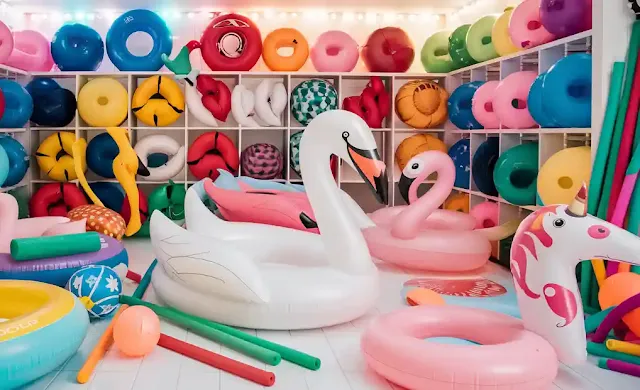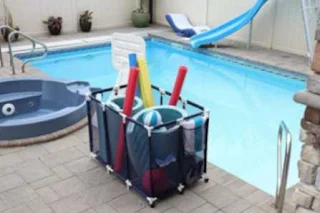Owning a pool is a blast, especially when you have an array of pool floats to enhance your fun. But what happens when the pool party is over and it's time to store those floats? Proper pool float storage is crucial not only for maintaining the longevity of your floats but also for keeping your pool area organized and clutter-free. In this guide, we'll dive into the best ways to store your pool floats, ensuring they stay in top shape for many summers to come.
Types of Pool Floats
Understanding the types of pool floats you own can help determine the best storage methods.
Inflatable Floats
These are the most common type of pool floats. They come in various shapes and sizes, from simple air mattresses to elaborate unicorns and flamingos. They require deflation for compact storage.
Foam Floats
Foam floats are typically more durable and do not require inflation. However, they can take up more space and need to be stored carefully to avoid damage.
Pool Noodles
These versatile floats are fun and functional. They are usually made of foam and are lightweight, making them easy to store in various ways.
Common Pool Float Storage Challenges
Space Constraints
One of the biggest challenges is finding enough space to store your pool floats. This can be particularly tricky if you have a small backyard or limited indoor storage space.
Weather Elements
Exposure to the sun, rain, and wind can significantly damage pool floats. Proper storage helps protect them from these elements.
Float Durability
Different floats have different durability levels. Foam floats, for example, can be more susceptible to tearing or denting if not stored properly.
Best Practices for Pool Float Storage
Cleaning Before Storage
Always clean your pool floats before storing them. This removes chlorine, salt, and other chemicals that can cause deterioration over time.
Deflating and Folding
For inflatable floats, deflating them fully and folding them neatly can save a lot of space. Use a pump to ensure all air is out.
Proper Drying Techniques
Make sure your floats are completely dry before storing to prevent mold and mildew growth. A sunny day is perfect for air drying them thoroughly.
Indoor Storage Solutions
Storage Bins
Large storage bins can be a simple and effective solution for storing pool floats. Look for bins with lids to keep dust and pests away.
Shelving Units
Install shelving units in your garage or basement to keep your floats off the floor and organized. Adjustable shelves can accommodate floats of various sizes.
Hanging Solutions
Hooks and racks mounted on the walls or ceiling can be great for storing lighter items like pool noodles and smaller floats.
Outdoor Storage Solutions
Pool Float Racks
Specialized racks are designed to hold multiple pool floats securely. These are ideal for quick access during the swimming season.
Storage Sheds
A small outdoor shed can provide ample storage space while protecting your floats from the elements.
Weather-Resistant Covers
For those who prefer keeping their floats outside, using weather-resistant covers can help protect them from sun and rain.
DIY Pool Float Storage Ideas
PVC Pipe Racks
Create a custom rack using PVC pipes. These can be cut and assembled to fit your specific storage needs and space constraints.
Repurposed Furniture
Old bookshelves or garden carts can be repurposed into pool float storage units with a bit of creativity and elbow grease.
Custom-Built Cabinets
If you're handy, building a custom cabinet tailored to your storage needs can be a rewarding project.
Seasonal Storage Tips
Summer vs. Winter Storage
During the summer, keep floats accessible for frequent use. In winter, store them in a dry, sheltered place to prevent weather damage.
Preparing Floats for Off-Season
Clean and thoroughly dry your floats before storing them for the winter. Consider using a vacuum sealer for inflatable floats to save space.
Maintaining Pool Floats During Storage
Preventing Mold and Mildew
Ensure that all floats are completely dry before storing. Using silica gel packs in storage containers can also help absorb excess moisture.
Repairing Minor Damages
Check your floats for any small tears or holes before storing them. Patch up minor damages to prevent them from worsening during storage.
Regular Inspections
Periodically check your stored floats for signs of damage or mold. This can help catch issues early and maintain their condition.
Innovative Storage Products on the Market
Modular Storage Systems
These systems can be customized and expanded to fit your changing storage needs, making them a versatile option.
Inflatable Storage Bags
These bags allow you to store multiple floats in a compact and organized manner. Some even come with vacuum-seal capabilities.
Multi-Purpose Storage Furniture
Furniture like benches with storage compartments can double as seating and storage, ideal for small spaces.
Space-Saving Tips for Small Pool Areas
Vertical Storage
Utilize vertical space by installing tall shelves or hanging racks. This keeps your floor area clear and maximizes storage capacity.
Under-Deck Solutions
If you have a deck, the space underneath can be an excellent place to store pool floats out of sight.
Wall-Mounted Hooks
Install hooks or pegboards on your walls to hang pool noodles and small floats, keeping them organized and easily accessible.
Eco-Friendly Storage Solutions
Using Sustainable Materials
Opt for storage solutions made from sustainable or recycled materials to reduce your environmental footprint.
Recycling Old Floats
When it's time to retire old floats, look for recycling programs that accept them instead of sending them to a landfill.
Environmentally Friendly Storage Products
Consider products designed with eco-friendliness in mind, such as biodegradable storage bags or non-toxic coatings for outdoor storage units.
Safety Considerations
Keeping Storage Areas Child-Safe
Ensure that storage areas are secure and out of reach of young children to prevent accidents.
Preventing Float Damage
Store floats in a way that prevents them from being punctured or torn, such as using soft padding or smooth surfaces.
Avoiding Pests
Check storage areas regularly for signs of pests and take preventative measures like sealing gaps and using repellents.
Cost-Effective Storage Hacks
Budget-Friendly DIY Projects
Many DIY storage solutions can be made with inexpensive materials like PVC pipes or repurposed wood.
Upcycling Household Items
Look around your home for items that can be repurposed for storage, like old laundry baskets or coat racks.
Thrift Store Finds
Thrift stores can be treasure troves for affordable storage solutions. Keep an eye out for shelves, bins, and other useful items.
Conclusion
Proper pool float storage is essential for maintaining the condition of your floats and keeping your pool area organized.
By following these tips and utilizing both indoor and outdoor storage solutions, you can ensure your pool floats are ready for action whenever you are.
Whether you go the DIY route or invest in innovative storage products, taking the time to store your floats correctly will pay off in the long run.
FAQs
How often should I clean my pool floats before storage?
Ideally, clean your pool floats after every use to remove chlorine and other chemicals. At the very least, give them a thorough cleaning before storing them for the season.
Can I leave my pool floats outside during winter?
It's not recommended. Winter weather can cause significant damage to pool floats. It's best to store them indoors in a dry, sheltered place.
What is the best way to prevent mold on pool floats?
Ensure your floats are completely dry before storing them. Using silica gel packs in storage containers can also help absorb any remaining moisture.
Are there any eco-friendly pool float storage options?
Yes, look for storage solutions made from sustainable materials, recycle old floats, and consider environmentally friendly storage products.
How can I maximize storage in a small pool area?
Utilize vertical storage, under-deck solutions, and wall-mounted hooks to save space and keep your pool area organized.


